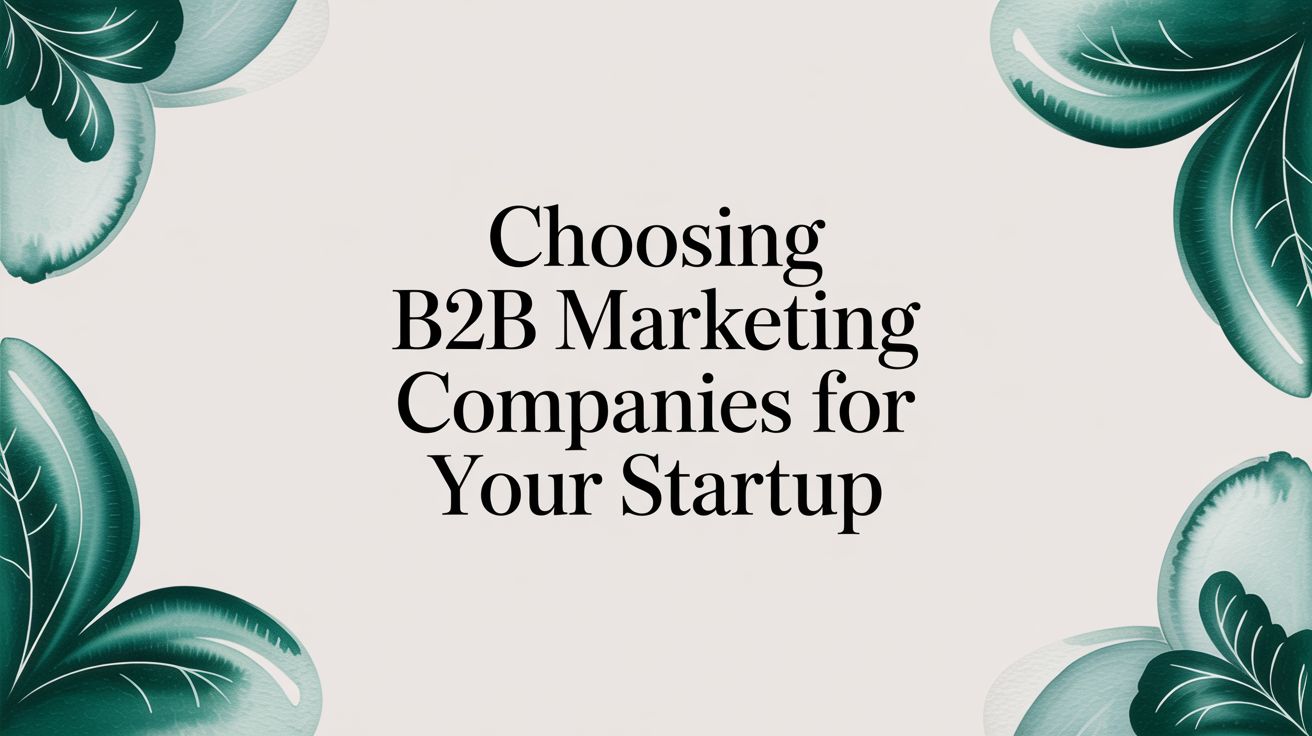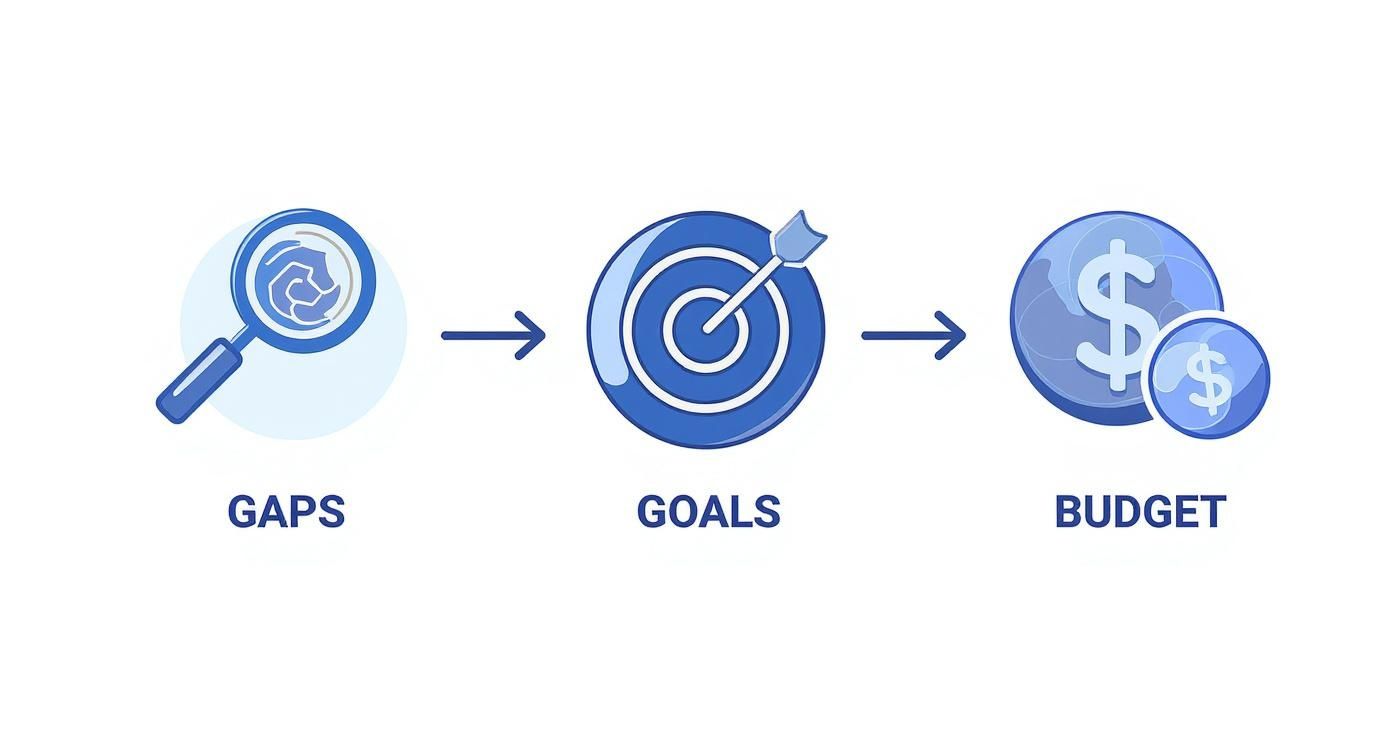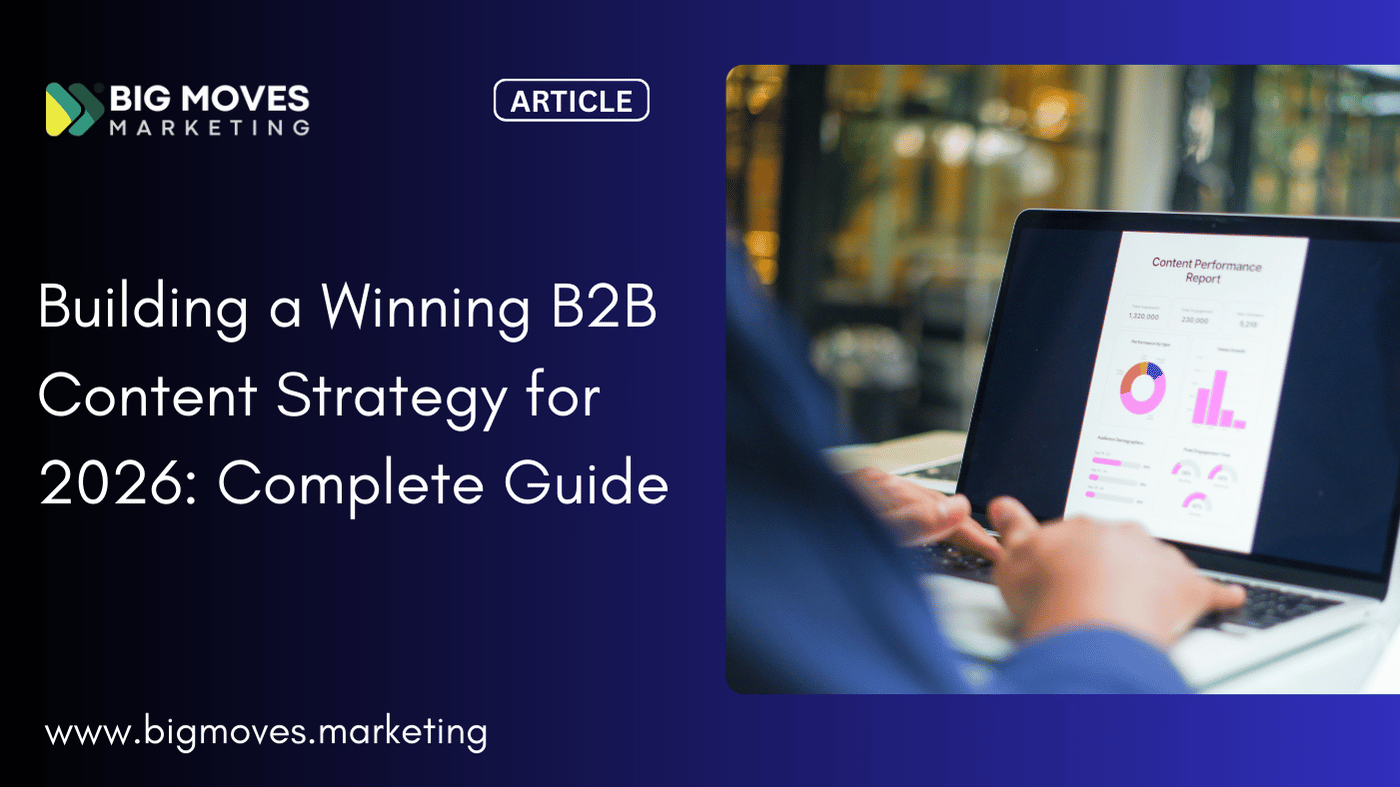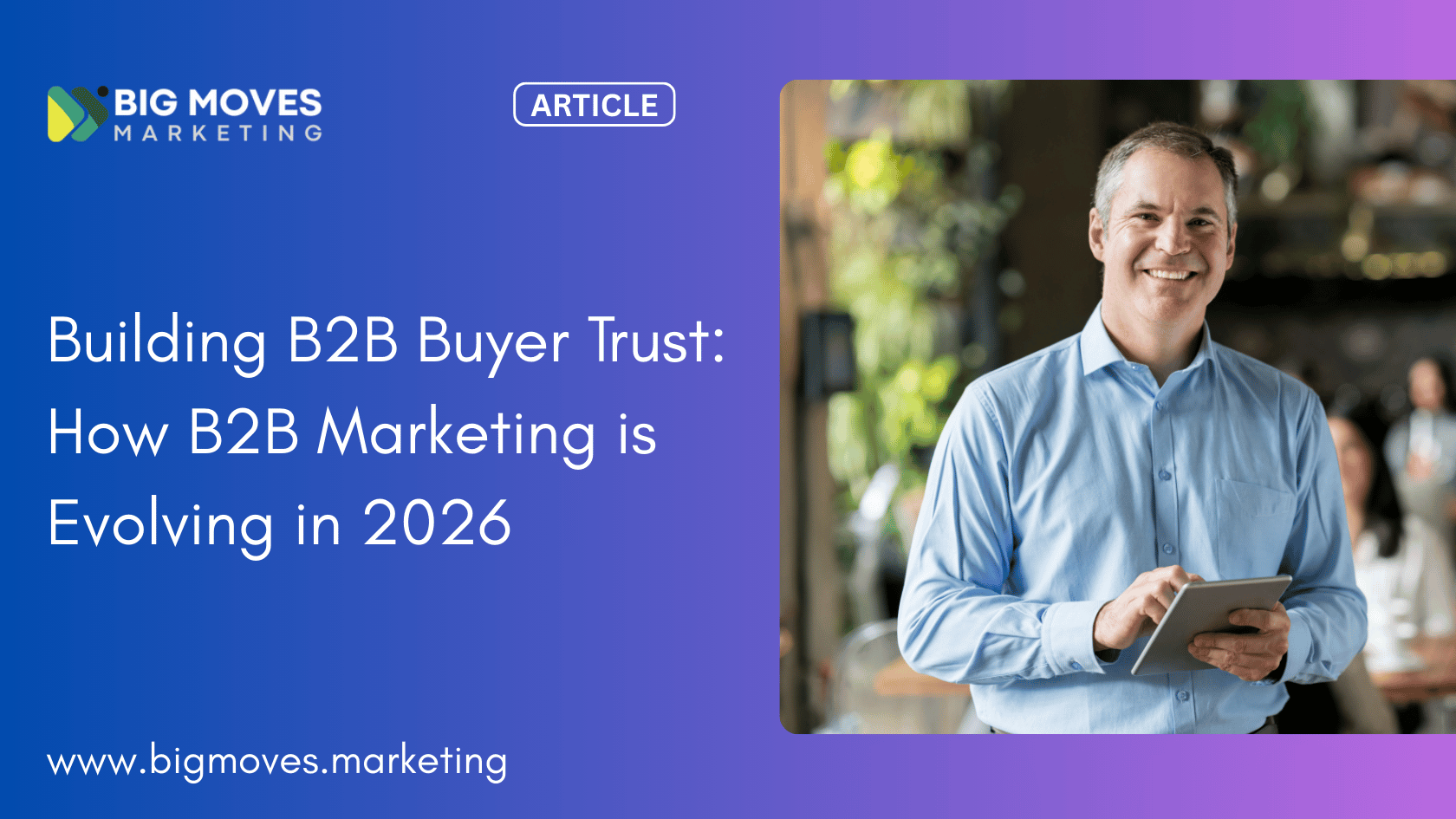Choosing B2B Marketing Companies for Your Startup

For a B2B SaaS startup, the right marketing partner is more than just a service provider—they’re an extension of your team. The very best B2B marketing companies don't just complete tasks; they act as true growth partners, embedding themselves in your mission to drive the metrics that actually matter, like monthly recurring revenue (MRR) and customer churn.
Moving Beyond Vendors to Find a True Growth Partner
Finding the right marketing support for your fast-growing tech company is one of the most critical decisions you'll make. Many traditional agencies are simply built for a different world—one with slower sales cycles, less complex products, and simpler buyer journeys. They often approach marketing as a checklist of deliverables rather than a driver of tangible business outcomes.
That old model just doesn't cut it for a B2B SaaS or tech startup. You need a partner who already speaks your language.
Why a Standard Agency Isn't Enough
The B2B tech world operates on its own set of rules. Your marketing partner needs a deep, intuitive grasp of concepts that are second nature to you but completely foreign to a generalist.
What does that look like in practice? It means they get:
- B2B Sales Cycles: They understand the nuances of a journey involving multiple decision-makers, technical evaluations, and long consideration periods. They know the difference between a product-led motion and an enterprise sales cycle.
- Key Business Metrics: Conversations should revolve around MRR, customer acquisition cost (CAC), and lifetime value (LTV)—not just vanity metrics like website traffic or social media likes.
- Technical Audiences: They must have proven experience creating content and campaigns that resonate with sophisticated buyers, from engineers and product managers to C-suite executives.
If you have to spend your valuable time and budget educating your "partner" on the basics of your own business model, you're already behind. That delay is costly, slowing your momentum when speed is everything.
The goal is to shift your mindset from hiring a service provider to strategically selecting a partner who is deeply invested in your business outcomes. A true partner thinks like an owner and is obsessed with your growth.
A New Model for Marketing Leadership
This guide is designed to give you a clear framework for making a confident decision. It's about cutting through the noise to find a team that can function as a genuine extension of your own.
For many startups, this means looking beyond the typical agency model. For instance, exploring the benefits of a fractional CMO for startups can bring high-level strategic direction without the full-time executive cost. This approach ensures your marketing efforts are guided by seasoned expertise from day one.
By focusing on partnership over procurement, you're setting the stage for sustainable, long-term success.
Pinpoint Your Marketing Needs Before You Search
Before you even think about Googling "B2B marketing agency," you need to do some serious internal work. The search for the right partner doesn't start with a list of agencies; it starts with an honest, unflinching look in the mirror.
Without this clarity, you're just window shopping. You'll end up hiring a team that solves the wrong problems or chases vanity metrics that don't actually move the needle for your business. This initial step turns a vague exploration into a targeted mission, arming you with the exact criteria you need to find a true partner.
Identify Your Most Critical Marketing Gaps
First things first: where does it hurt the most? Pinpoint what's really holding your growth back. Are you shouting into the void with zero brand recognition, or is the problem that your sales team's pipeline is bone dry?
For most B2B SaaS startups, the pain points usually fall into one of these buckets:
- Lead Generation: The pipeline feels empty. Your sales team is getting restless, waiting for qualified opportunities that just aren't coming. You need a reliable engine that consistently delivers prospects who actually fit your ideal customer profile.
- Brand Awareness: You've built a fantastic product, but it feels like you're the world's best-kept secret. You need to carve out a space in your niche, build authority, and become a name people recognize and trust.
- Content Creation: You know you need high-quality blog posts, compelling case studies, and in-depth whitepapers to educate your technical audience, but you simply don't have the time or in-house expertise to create them.
- Product Marketing: A huge product launch or feature update is on the horizon, but you're not sure how to make a real splash. You need a concrete strategy to make sure it lands with impact and doesn't just fizzle out.
This isn't about listing every tiny weakness. It's about finding the one or two major bottlenecks that, if you could just fix them, would unlock the most significant growth for your company.
Your marketing gaps define the mission. Once you know the exact problem you need to solve, you can find a specialist equipped with the right tools and experience to solve it.
Set Measurable Goals and a Realistic Budget
Once you've identified your primary gaps, you need to translate them into specific, measurable goals. "Get more leads" is a wish, not a goal. Actionable targets leave no room for interpretation.
For example, instead of a vague objective, aim for something concrete like increasing marketing qualified leads (MQLs) by 30% in the next quarter. Or maybe your focus is efficiency, so a goal could be to reduce customer acquisition cost (CAC) by 15% over the next six months.
With clear goals in place, it’s time to talk money. Setting a realistic budget is a vital step that needs to happen internally before you start outreach. It keeps you from wasting time drooling over agencies you can't afford and ensures every conversation you have is grounded in reality.
The demand for specialized B2B marketing expertise is heating up, and the best partners are often booked solid. Leading agencies are reporting gross incomes as high as $270 million, while smaller, more agile firms have seen income growth of nearly 68%. This just goes to show how much value companies are placing on finding the right expertise. You can find more insights on the growth in the B2B agency sector.
Verify Their SaaS and Tech Industry Expertise
Let's get one thing straight: not all B2B marketing is created equal. An agency that gets stellar results for a manufacturing company will almost certainly face a steep learning curve with a B2B SaaS business. The nuances are just too different.
For a tech startup, finding a partner with deep, proven experience in your world isn't a "nice-to-have." It's a dealbreaker.
They need to understand your business model from the inside out. When you talk about ACV, LTV, and the constant battle against churn, they should be nodding along, not scrambling for a dictionary. Mention your product-led growth (PLG) motion, and they should be able to talk strategy, not give you a blank stare.
Asking the Right Questions
The vetting process is where you separate the real experts from the pretenders. Anyone can put "B2B Marketing" on their website. Your job is to dig deeper with questions that force them to show, not just tell.
Go into your calls armed with a few pointed inquiries designed to test their tech fluency.
- "Can you walk me through a demand generation campaign you ran for a B2B SaaS company with a similar ACV to ours?" This forces them to get specific and proves they've worked with your exact business model.
- "How do you approach creating content for a highly technical audience, like software engineers or data scientists?" This tests their grasp of your buyer personas and their ability to translate complex features into compelling benefits.
- "What's your experience marketing a product with a free trial or freemium model versus one that's purely sales-led?" Their answer reveals their strategic depth and whether they can handle different go-to-market motions.
An agency's portfolio should be filled with B2B SaaS and tech companies you recognize. If their case studies feature dentists and restaurants, they are not the right fit for your highly specialized needs.
This visualization lays out a simple but effective process for defining what you actually need from a partner.

Starting by identifying your internal gaps and then setting clear goals and a budget ensures you’re looking for a partner to solve specific, high-value problems—not just "do marketing."
To help structure your evaluation, use a simple checklist to compare potential agencies side-by-side. This keeps the process objective and ensures you don't overlook critical SaaS-specific criteria.
B2B SaaS Startup Agency Evaluation Checklist
Using a scorecard like this helps you move beyond a gut feeling and make a data-informed decision based on what truly matters for a B2B SaaS company's growth.
Look for Proven Success in Your Niche
Beyond just general SaaS experience, consider their track record within your specific vertical. If you're building a fintech product, an agency that already understands the regulatory realities and customer pain points is leagues ahead of a generalist. The same goes for healthtech, edtech, or cybersecurity.
Ideally, their team should include people who have genuinely worked in the tech industry, not just for it. That firsthand experience is invaluable. For a closer look at what a modern, specialized strategy entails, our guide on the B2B marketing approach offers more context.
Ultimately, this step is about confirmation. You’re confirming they speak your language, grasp your buyer's journey, and have a playbook for helping companies just like yours win. Anything less is a gamble you can't afford to take.
Assess Their Focus on Channels That Drive Revenue

Here’s a hard truth: the best B2B marketing companies aren't just ticking boxes. They’re building revenue engines. They get that for a B2B SaaS startup, marketing isn't an art project—it's the core function that fuels growth, period.
Your partner needs to be absolutely obsessed with measurable results, not vanity metrics. Forget chasing likes or impressions. The entire conversation should revolve around what actually moves the needle: pipeline velocity, customer acquisition cost, and ultimately, closed-won deals.
Questioning Beyond the Surface
To figure out if they have this revenue-first mindset, you have to dig deeper. Don't just ask if they do email marketing. That’s a simple yes/no.
Instead, ask them to walk you through their process for building and segmenting a list, creating nurture sequences, and tying specific email campaigns back to actual leads. See the difference? These kinds of questions force a conversation about strategy and outcomes, not just a checklist of services.
Here are a few questions I always use to separate the talkers from the doers:
- "What's your process for nurturing leads with email automation?" This tests their understanding of the long B2B sales cycle. Can they guide a prospect from a curious click to a sales-ready lead?
- "How do you attribute marketing activities to closed-won deals?" Their answer here is telling. It reveals their technical skill with CRMs and marketing automation platforms and, more importantly, whether they actually connect their work to your revenue.
- "Can you show me a report that connects your work directly to pipeline or revenue for a past client?" This is the ultimate proof. A results-focused agency won't flinch. They'll have this data ready to go.
A true growth partner thinks like a business owner. They are relentlessly focused on delivering a clear return on your investment and can prove it with hard data, not just pretty presentations.
Identifying High-Impact Channels
Now, while a multi-channel strategy sounds good on paper, not all channels are created equal, especially in the B2B tech world. A sharp partner knows exactly where to focus your limited budget for maximum impact. You want someone with deep expertise in the channels that actually matter for B2B SaaS.
Email marketing, for instance, is still an absolute powerhouse. Research shows that 50% of B2B marketers point to email as their top channel for lead generation and ROI. The numbers are staggering—it can deliver up to $70 in revenue for every $1 spent. Search optimization and content marketing are right behind it.
Any potential partner's strategy should reflect this reality. They need to show a sophisticated grasp of how to use these core channels to build a predictable lead generation engine. If you're looking for more ideas on this, we've put together a guide covering 9 essential B2B channels to drive growth in 2025.
Ultimately, you’re looking for a team that has a clear, data-backed methodology for getting results. They should be able to tell you exactly how their work on specific channels will translate into the tangible business outcomes your startup needs to survive and thrive.
See How They’ll Actually Work With Your Team

Here's a hard truth I've learned over the years: the most brilliant strategy on paper will absolutely crumble if the day-to-day working relationship is a mess.
A true partnership is about way more than just deliverables. It’s about clear communication, easy collaboration, and a feeling that you’re both pulling in the same direction. Before you even think about signing a contract, you have to get a real feel for how they’ll integrate with your crew.
Those initial conversations are incredibly revealing, so pay close attention. Are they genuinely listening to your challenges and asking smart, insightful questions? Or are they just waiting for their turn to launch into a canned pitch?
One of the best signs is when they push back a little. If they challenge a flawed assumption or offer a creative solution you hadn't considered, it shows they’re already thinking critically about your business—not just nodding along to win the contract.
Understanding Their Communication Cadence
Consistent, transparent communication is the bedrock of any successful agency relationship. You need to know their process for keeping you in the loop. A vague or non-existent structure here is a massive red flag that almost always leads to missed deadlines and a whole lot of frustration.
Find out exactly what to expect.
- Reporting: How do they track and measure success? Ask to see a sample report. You're looking for something that’s transparent, easy to digest, and focused on the metrics that actually matter to your startup—not a bunch of vanity stats.
- Check-ins: How often will you meet? A weekly or bi-weekly call is pretty standard for most B2B marketing companies, but the format is what counts. You need strategic discussions, not just a 30-minute status update that could have been an email.
- Project Management: What tools do they live in? Whether it’s Asana, Trello, or Slack, a clear system for tracking progress is non-negotiable. It’s what keeps everyone on the same page and ensures nothing falls through the cracks.
The right partner feels like a natural extension of your own team. They’re proactive, transparent, and always focused on solving problems together. The whole process should feel seamless, even inspiring.
Cultural Fit and Collaborative Spirit
Beyond the processes and tools, you're looking for genuine cultural alignment. This partner will be deeply involved in telling your company’s story. You have to trust their judgment, respect their insights, and—frankly—enjoy working with them.
This is about finding a team that matches your startup’s energy and drive. They should be agile, adaptable, and genuinely excited by the chaos and challenge of rapid growth. This collaborative spirit is what transforms a simple vendor relationship into a powerful growth partnership.
As you consider bringing on an external team, it's also the perfect time to look inward. Our guide on how to build your B2B marketing team structure can help you figure out how an agency will best complement your in-house talent. The goal is to create a seamless unit where everyone is pulling in the same direction, united by a shared vision.
Frequently Asked Questions
Choosing the right partner to help your startup grow is a big deal. It’s only natural to have a few questions as you sort through the different B2B marketing companies out there.
Here are some of the most common things we hear from B2B SaaS founders like you.
What Is the Typical Cost of Hiring B2B Marketing Companies?
Honestly, the costs are all over the map. It really depends on what you need and the agency’s reputation.
A monthly retainer could be anywhere from $5,000 per month for a single service, like SEO or content, to well over $25,000 per month for a full-blown, multi-channel strategy. Project-based pricing is also pretty common for one-off needs.
But here’s my advice: don’t just focus on the price tag. Focus on the potential ROI. An inexpensive agency that doesn’t get the B2B SaaS world can end up costing you a fortune in wasted time, missed opportunities, and flat-out bad results.
The right investment isn't about finding the cheapest option; it's about finding the partner who can generate the greatest return. A high-performing team will more than pay for themselves through the revenue they help you generate.
Should I Choose a Specialized B2B Agency or a Generalist One?
For any B2B SaaS or tech startup, a specialized agency is almost always the right call. I’d go as far as saying it’s a strategic necessity, not just a preference.
Think about it: specialists already speak your language. They live and breathe metrics like LTV, CAC, and MRR. They get your audience’s pain points and have been through your exact sales cycle dozens of times before.
A generalist agency, on the other hand, has to learn all of that on your dime. That learning curve often leads to generic, ineffective strategies that just don’t hit the mark. For a deeper look at this, it’s worth reading up on the unique value a B2B marketing consultant with niche expertise brings to the table.
How Long Does It Take to See Results?
This one comes down to the strategies you’re running, and it's super important to set realistic expectations from the start.
- Long-Term Strategies: Things like SEO and organic content marketing are a slow burn. Realistically, you’re looking at 6-12 months to build real momentum and see significant, lasting growth.
- Short-Term Strategies: With paid ads or a super-targeted outreach campaign, you can start seeing the first leads and conversions roll in within 1-3 months.
Any agency worth its salt will be upfront about these timelines. They should work with you to build a roadmap that balances quick wins with those bigger, long-term goals, making sure everyone’s on the same page from day one.
What Are the Key Red Flags to Watch For?
As you’re talking to different agencies, keep your eyes open for a few common warning signs. These can help you dodge a bad partnership before it starts.
Be wary of any agency that:
- Guarantees specific results, like promising you the #1 spot on Google.
- Is cagey or lacks transparency about their process or who’s actually doing the work.
- Doesn't ask you tough questions about your business, your customers, and your goals.
- Uses high-pressure sales tactics to rush you into signing a contract.
At the end of the day, trust your gut. If a potential partner seems to be pushing a one-size-fits-all solution or is hiding behind a wall of jargon, they probably aren't the right fit.
At Big Moves Marketing, I focus on building the positioning, sales tools, and launch strategies that drive real adoption and revenue for B2B SaaS and AI startups. If you're ready to partner with an expert who understands your world, let's connect. Learn more at bigmoves.marketing.
%20png%20copy.png)






%20-%20white.svg)
